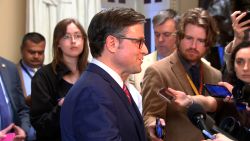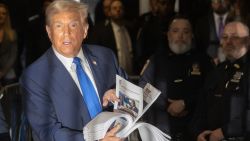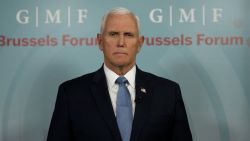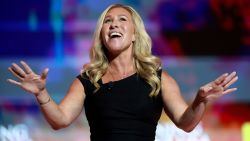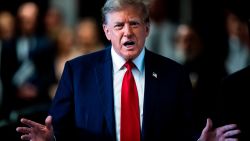A version of this story appeared in CNN’s What Matters newsletter. To get it in your inbox, sign up for free here.
There are Democrats and Republicans in office, and we refer to them as Democrats and Republicans in this newsletter because that’s how they vote.
But those words don’t paint the full picture.
On the left, there are Joe Manchin Democrats worried about the debt, Joe Biden Democrats looking to cement a legacy and Elizabeth Warren Democrats who want to change the fabric of society.
The same holds true on the right.
There are Donald Trump Republicans attacking democracy, Liz Cheney Republicans who are horrified and Mitch McConnell Republicans who just want to move on.
And what kind of Republican is Sen. Lisa Murkowski of Alaska? She is supportive of abortion rights and voted to convict Trump at one of his impeachment trials. She announced Friday she’ll seek reelection as a Republican.
Different types of American political animals
An expansive new Pew Research Center survey, mostly conducted in July, breaks the American electorate into nine distinct groups, which Pew calls “political typology.” It’s something it’s produced periodically since the 1980s, but the findings released this week are based on a much larger sample size.
Republicans, in this view, are a coalition of four subgroups:
- Faith and Flag Conservatives.
- Committed Conservatives.
- Populist Right.
- Ambivalent Right.
Democrats are also a coalition of four subgroups:
- Progressive Left.
- Establishment Liberals.
- Democratic Mainstays.
- Outsider Left.
A large portion of the public – 15% – makes up Pew’s ninth group: Stressed Sideliners. These are people who don’t have a clear partisan orientation, have a mix of conservative and liberal views and may not take part in elections.
Read Pew’s descriptions of all of these groups of people. The descriptions are interesting in part because the Republican caricature of Democrats is that they are socialist. The Progressive Left, however, makes up the smallest proportion of both the general public and those who vote or lean toward Democrats.
RELATED: Why neither party has a sustainable political majority
Similarly, the GOP is much more than just the Trump-supporting Populist Right than recent Democratic slogans would have you believe. Pew found a large portion of Republican-leaners would just as soon move on from Trump.
Republicans are divided on their level of support for businesses, their support for low taxes and their commitment to outlawing abortion, according to the survey.
Democrats are divided on the role of religion in society and how to address racial inequality.
Race is the issue that yielded the most partisan divides. On race, the vast majority of all the Democratic subgroups think a lot more needs to be done to ensure equal rights. It’s less than a quarter for all the Republican subgroups.
What type is Manchin?
The typology is hard to apply to individual people, like Manchin.
I think Manchin would fit somewhere inside the Democratic Mainstays column, but he is a special case. He hasn’t so much influenced Biden’s agenda as he’s rewritten the whole thing.
By exerting the extreme power of his single, decisive vote, Manchin has changed the format of the social spending bill – the one Biden wants Congress to pass to complement the large infrastructure bill he intends to sign on Monday.
Manchin’s objections so far have:
- Nearly halved the size of the bill.
- Jeopardized guaranteed paid family leave.
- Scuttled a tax on billionaires.
- Mostly deleted an expansion of Medicare.
- Completely changed the bill’s approach to climate change.
Manchin isn’t done, either.
This week he expressed frustration that the bill has extra tax credits of $4,500 for US-made electric vehicles assembled with union labor. These credits would be on top of tax credits for non-US-made, non-union-assembled vehicles.
If Manchin decides he’d like to wait until next year to vote on the social safety net bill in the Senate, Democrats will have to do that. They need his vote.
You can appreciate the courage of his convictions and be frustrated by his power. If Democrats had won just one more Senate seat in 2020, this would not be happening.
He also represents the fact that a big tent makes a majority. All the Democrats crying he’s not committed to the party’s principles sound a lot like Trump whining about “RINOs” – “Republicans in Name Only” – whose major transgression is opposing the former President’s assault on democracy.
About climate change
Speaking of the political parties, there’s another interesting poll out Friday from the Washington Post and ABC News on the electorate’s views on climate change.
It comes as countries gathered in Scotland struggle to finalize a working agreement to cut down on climate change, which has a lot to do with cutting down on the use of coal. Read the latest here.
It also comes as Democrats’ plan to combat climate change, mostly wrapped in their social spending bill, is at the mercy of Manchin, who represents a state that identifies itself with coal.
The large majority of Americans – 70% – say the federal government should regulate the release of greenhouse gases, according to the poll. That includes 90% of Democrats and 73% of Independents. It also includes 47% of Republicans.
In fact, Republicans are about evenly split: 47% say the government should regulate greenhouse gases and 46% say it should not. Seven percent are undecided. And yet the party’s leaders have essentially formed a blockade against action to address climate change in the Senate.
That may be tied to the fact that the poll also finds an increasing partisan divide on climate change. Democratic concern has grown as Republican concern has shrunk. The share of Americans overall who say that global warming is a serious problem – two-thirds – is largely unchanged in the past seven years, according to the Post-ABC poll.
This is the great problem of US politics. The American people are not evenly divided into two groups. But their government is built as if they are.


![Rep. Liz Cheney [R-WY] speaks as the US congressional committee investigating the January 6 attack at the Capitol, at the Cannon Office Building on October 19, 2021 in Washington, DC. - US congressional committee is meeting to vote on criminal contempt charges against Steve Bannon, one of former President Donald Trump's closest allies. (Photo by Olivier DOULIERY / AFP) (Photo by OLIVIER DOULIERY/AFP via Getty Images)](https://media.cnn.com/api/v1/images/stellar/prod/211021084459-liz-cheney-10-19-2021.jpg?q=x_5,y_295,h_2807,w_4989,c_crop/w_850)
![Rep. Liz Cheney [R-WY] speaks as the US congressional committee investigating the January 6 attack at the Capitol, at the Cannon Office Building on October 19, 2021 in Washington, DC. - US congressional committee is meeting to vote on criminal contempt charges against Steve Bannon, one of former President Donald Trump's closest allies. (Photo by Olivier DOULIERY / AFP) (Photo by OLIVIER DOULIERY/AFP via Getty Images)](https://media.cnn.com/api/v1/images/stellar/prod/211021084459-liz-cheney-10-19-2021.jpg?q=x_5,y_295,h_2807,w_4989,c_crop/w_250)

